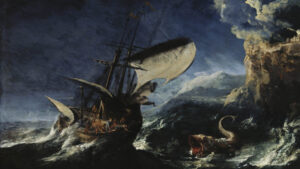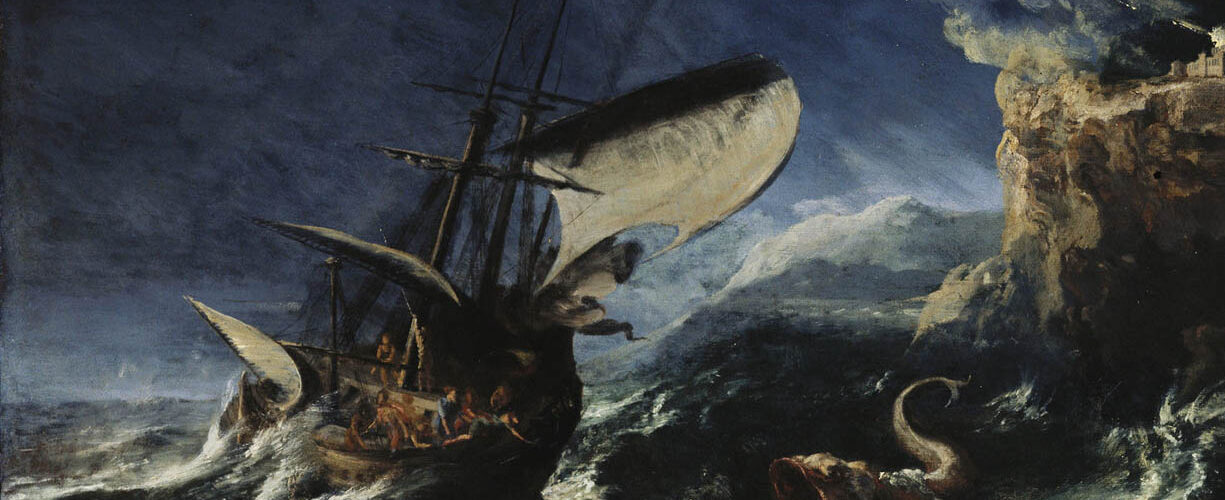Escape from the Great Fish
Podcast: Play in new window | Download
Subscribe: RSS
 TITLE: Escape from the Great Fish
TITLE: Escape from the Great Fish
SUBJECT: Great Escapes of the Bible
PROPOSITION: In the story of Jonah we see 1) A Command, 2) A Contradiction, 3) A Confrontation, 4) A Correction.
OBJECTIVE: When we ignore God’s commands, we forsake our own mercy.
INTRODUCTION:
1. Read: Jonah 1:1-3
2. About the Text:
1) We are all familiar with the story of Jonah.
2) Some have doubted the story, but Jesus said it was true (Matthew 12:40).
3) As part of the Great Escapes of the Bible series, let’s see how Jonah escaped.
3. Ref. to S, T, P, O, and A.
DISCUSSION: In the story of Jonah we see . . .
I. A Command
1. God had a command for Jonah.
1) “Arise, go to Nineveh, that great city, and cry out against it; for their wickedness has come up before Me” (Jonah 1:2).
2) Arise
3) Go to Nineveh
4) Cry out against it.
2. Who was Jonah?
1) He was the son of Amittai.
2) He was a prophet of Israel according to 2 Kings 14:25-27.
3) He prophesied around 780 B.C.
3. Who was Nineveh?
1) The capital city of Assyria located on the Tigress River in the North.
2) They were the enemy of Israel at the time of Jonah’s prophecy.
3) They eventually conquered Israel around 710 B.C.
4. God wanted Jonah to prophesy against Assyria to get them to repent.
1) God did not want to destroy them. “’For I have no pleasure in the death of one who dies,’ says the Lord God. ‘Therefore turn and live!’” (Ezekiel 18:32).
2) “And should I not pity Nineveh, that great city, in which are more than one hundred and twenty thousand persons who cannot discern between their right hand and their left—and much livestock?” (Jonah 4:11).
5. Today, God has commanded us to preach the gospel to all (Mark 16:15-16).
II. A Contradiction
1. Jonah did not obey the command of God.
1) He fled to Tarshish.
2) He fled from the presence of the Lord.
3) He found a ship at Joppa and paid the fare.
2. Where was Tarshish
1) Northern Africa or Southern Spain.
2) It was the opposite direction from Nineveh.
3. The Presence of the Lord
1) Where did Jonah think this was? Perhaps in the land of Israel.
2) Can one flee from the presence of the Lord? No. Psalm 139:7-10.
4. He found a ship and paid the fare at Joppa.
1) He wanted the protection of being a legitimate passenger.
2) He went to great lengths to get away from God’s command.
5. What do we do to run away from God?
1) Some use drugs, legal and illegal.
2) Some escape through entertainment, movies, television, video games, etc.
3) Some escape through work, claiming a “legitimate” passage.
4) “The eyes of the Lord are in every place, Keeping watch on the evil and the good” (Proverbs 15:13).
5) “And there is no creature hidden from His sight, but all things are naked and open to the eyes of Him to whom we must give account” (Hebrews 4:13).
III. A Confrontation
1. The Lord confronts Jonah’s disobedience.
1) He sent out a great wind that threatened the safety of the ship.
2) The men threw their cargo into the sea to lighten the boat.
3) Jonah had gone into the hold to sleep.
2. The Captain confronts Jonah’s disobedience.
1) The captain woke him up from sleeping.
2) He told him to call on his God so that they could be saved.
3. The Crew confronts Jonah’s disobedience.
1) They cast lots to see who was responsible for the trouble.
2) The lot fell on Jonah.
3) He tells them his identity (9).
4) The crew were afraid because of what Jonah had done.
5) They wanted to know what to do.
4. Jonah confronts his own disobedience.
1) He tells them to throw him into the sea.
2) The men didn’t want to do it, but finally relented.
3) They prayed that God would not charge them with innocent blood.
4) They offered a sacrifice to the Lord and took vows.
5. Are we confronting the issues that separate us from God?
1) “Examine yourselves as to whether you are in the faith. Test yourselves. Do you not know yourselves, that Jesus Christ is in you?—unless indeed you are disqualified” (2 Corinthians 13:5).
2) “Brethren, if a man is overtaken in any trespass, you who are spiritual restore such a one in a spirit of gentleness, considering yourself lest you also be tempted” (Galatians 6:1).
IV. Correction
1. God corrects Jonah’s disobedience.
1) He prepared a great fish.
2) This fish swallowed Jonah.
3) He was in the belly for three days and three nights.
2. Jonah asks God for help in his affliction.
1) Jonah waited until he was near death to call on God.
2) Even in such circumstances, God heard his prayer.
3. Jonah learns that he is his own worst enemy.
1) “Those who regard worthless idols forsake their own mercy.”
2) “Salvation is of the Lord.”
4. God saves Jonah from the great fish.
1) He spoke to it.
2) It vomited Jonah on dry ground.
5. How do we accept the correction of the Lord?
1) “As many as I love, I rebuke and chasten. Therefore be zealous and repent” (Revelation 3:19).
2) “For whom the Lord loves He corrects, Just as a father the son in whom he delights” (Proverbs 3:12).
CONCLUSION:
1. Jonah’s escape from the great fish could have been prevented if he had obeyed God.
2. Let us remember 1) Command, 2) Contradiction, 3) Confrontation, and 4) Correction.
3. Invitation

